
Contrastive Pragmatics
Scope & Guideline
Advancing linguistic frontiers through contrastive insights.
Introduction
Aims and Scopes
- Cross-Cultural Pragmatics:
The journal explores how pragmatic norms and language use vary across different cultures, highlighting the implications for communication in multilingual contexts. - Contrastive Analysis of Pragmatic Features:
It emphasizes the comparison of pragmatic elements such as requests, confirmations, and politeness markers across languages, providing insights into their functional differences. - Pragmatics in Social Interaction:
Research often focuses on how language is used in real-life interactions, including turn-taking, disagreement, and negotiation, reflecting the dynamic nature of communication. - Interdisciplinary Approaches:
The journal incorporates perspectives from various fields such as linguistics, sociology, and discourse analysis, enriching the understanding of pragmatics. - Methodological Diversity:
It employs a range of methodologies, including qualitative analyses, corpus studies, and experimental approaches, to investigate pragmatic phenomena.
Trending and Emerging
- Requests for Confirmation and Reconfirmation:
An increasing number of studies focus on the nuances of requesting confirmation across various languages, highlighting the importance of contextual factors in communication. - Cyberpragmatics:
The exploration of language use in digital contexts, such as social media and online interactions, is gaining traction, addressing how digital communication alters traditional pragmatic norms. - Multilingual and Multicultural Perspectives:
There is a growing emphasis on research that incorporates multilingual and multicultural contexts, reflecting the globalized nature of communication and the need for cross-cultural understanding. - Pragmatic Markers in Discourse:
Recent works are increasingly analyzing pragmatic markers and their roles in discourse, examining how these markers function differently across languages and contexts. - Interdisciplinary Collaborations:
Emerging themes highlight collaborations between linguistics and other fields such as psychology, sociology, and education, enhancing the understanding of pragmatics in varied contexts.
Declining or Waning
- Traditional Speech Act Theory:
There has been a noticeable decrease in research strictly adhering to traditional speech act theory, as scholars increasingly adopt more nuanced frameworks that account for context and variation. - Focus on Isolated Language Studies:
Earlier works often concentrated on individual languages in isolation. However, the trend has shifted towards comparative studies that emphasize interaction between languages, leading to less frequent publication of isolated language analyses. - Static Views of Politeness:
Research that treats politeness as a static concept is becoming less common. The focus is shifting towards understanding politeness as a dynamic and context-dependent phenomenon. - Overemphasis on Formal Linguistic Structures:
There is a declining interest in studies that prioritize formal linguistic structures over the pragmatic functions of language, as the field moves towards more functional and interactional perspectives.
Similar Journals

Intercultural Pragmatics
Unlocking the Secrets of Language in Diverse Contexts.Intercultural Pragmatics, published by De Gruyter Mouton in Germany, stands at the forefront of the study of communication across diverse cultures, bridging the gap between linguistic theory and real-world intercultural exchanges. With an ISSN of 1612-295X and an E-ISSN of 1613-365X, this esteemed journal has been contributing to the field since its inception in 2004, showcasing rigorous scholarship through its convergence of literature up to 2024. The journal enjoys a commendable reputation, positioned in the Q2 quartile of Communication and the Q1 quartile of Linguistics and Language, reflecting its significant impact within the academic community. As recognized in Scopus rankings, it is ranked #122 out of 1088 in Arts and Humanities (Language and Linguistics) and holds an impressive 88th percentile, making it an essential resource for researchers, professionals, and students eager to deepen their understanding of intercultural dynamics. While access options remain standard, the journal prioritizes groundbreaking insights and theoretical advancements that contribute to the ever-evolving landscape of linguistics and intercultural communication.

Archivum
Bridging Academia and Open Knowledge Since 1951Archivum, published by UNIV OVIEDO in Spain, stands as a vital resource in the fields of Linguistics and Language as well as Literature and Literary Theory. With an impact factor reflective of its commitment to scholarly excellence, this journal has proudly maintained an Open Access model since 1951, ensuring that its rich repository of knowledge is freely available to researchers, professionals, and students alike. Covering a converged span from 2019 to 2023, Archivum has strategically positioned itself within the academic milieu, currently categorized in the Q4 for Linguistics and Language and Q3 for Literature and Literary Theory as of 2023. The journal is indexed in Scopus, with rankings that reflect its growing influence, such as #690 in Literature and Literary Theory and #887 in Language and Linguistics. Despite its challenges in visibility, Archivum remains essential for those seeking to engage with contemporary discussions and research within the humanities. Located in the heart of Asturias, it embodies the scholarly spirit of Spain, fostering a collaborative environment for innovation and inquiry in linguistic and literary studies.
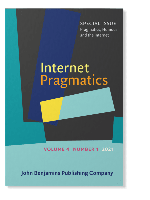
Internet Pragmatics
Navigating the Evolving Landscape of Internet CommunicationInternet Pragmatics, published by John Benjamins Publishing Company, stands as an essential journal within the fields of Computer Networks and Communications and Linguistics and Language. With an ISSN of 2542-3851 and an E-ISSN of 2542-386X, it has been dedicated to exploring the nuanced interactions and societal implications enabled by the internet since its inception in 2019. The journal has quickly gained a strong academic reputation, achieving a Q3 ranking in its Computer Networks and Communications category and a prestigious Q1 ranking in Linguistics and Language for 2023, showcasing its vital contribution to interdisciplinary discourse. Researchers and professionals alike can benefit from its robust collection of articles that delve into the intersection of technology and communication, making it a pivotal resource for those keen on understanding the evolving landscape of digital interaction. Although currently available through traditional access options, the journal endeavors to broaden access, ensuring that valuable insights in this rapidly advancing field reach a wider audience.
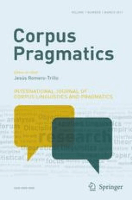
Corpus Pragmatics
Transforming Linguistics with Cutting-Edge Computational ApplicationsCorpus Pragmatics is an esteemed academic journal published by SpringerNature, focusing on the interdisciplinary field of linguistics and its applications within the realms of computer science and social sciences. With a strong foundation since its inception in 2017, the journal has made significant strides, earning recognition with a Q2 rating in Linguistics and Language and a Q3 in Computer Science Applications as of 2023. The journal's impressive Scopus rankings highlight its impact, placing it in the 86th percentile among language and linguistics journals. Corpus Pragmatics aims to bridge the gap between empirical research and theoretical insights, fostering an environment that promotes innovative approaches to understanding the complexities of language use in a digital age. As an open-access platform, it provides researchers, professionals, and students with invaluable resources to enhance their work and engage with the latest findings in the field. With a commitment to quality and relevance, Corpus Pragmatics stands out as a vital resource for advancing knowledge in linguistics and its computational applications, making significant contributions to both academia and industry.
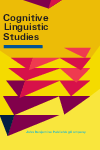
Cognitive Linguistic Studies
Innovating Perspectives in Cognitive Science and LinguisticsCognitive Linguistic Studies is a prestigious journal published by JOHN BENJAMINS PUBLISHING CO, dedicated to advancing the interdisciplinary field of cognitive linguistics. With an ISSN of 2213-8722 and an E-ISSN of 2213-8730, the journal serves as an essential platform for the dissemination of high-quality research that delves into the intricate relationships between language, thought, and cultural contexts. Located in the vibrant academic milieu of the Netherlands, this journal has gained recognition for its impactful contributions, reflected in its respectable Q2 category ranking within the field of Linguistics and Language as of 2023. Redesigned to accommodate a broader audience, the journal welcomes original research articles, reviews, and theoretical discussions that bridge cognitive science and linguistic inquiry. As the journal continues its trajectory of growth, being indexed with a solid Scopus rank of #459 out of 1167 in the social sciences, it remains a vital resource for researchers, professionals, and students eager to explore the dynamic interplay between cognition and language.
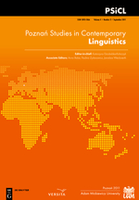
Poznan Studies in Contemporary Linguistics
Navigating the complexities of contemporary language.Poznan Studies in Contemporary Linguistics, published by DE GRUYTER MOUTON, is a pivotal journal in the field of linguistics, with an ISSN of 0137-2459 and an E-ISSN of 1897-7499. Located in Germany, this esteemed journal has consistently contributed to the academic landscape since its inception. As of 2023, it holds a Q2 category rank in Linguistics and Language and boasts commendable Scopus rankings, featuring in the 69th percentile for Arts and Humanities and the 66th percentile for Social Sciences. The journal emerges as a vital platform for scholars to explore contemporary linguistic theories and practices, making it an essential resource for researchers, professionals, and students alike. With a converged publication period from 2007 to 2024, it aims to facilitate a deeper understanding of linguistic advancements and trends. While the journal currently does not offer open access, its rigorous peer-review process ensures the highest quality of published research, strengthening its role as a leading discourse in the dynamic field of linguistics.
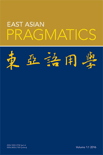
East Asian Pragmatics
Cultivating Insights in East Asian Linguistic StudiesEast Asian Pragmatics, published by EQUINOX PUBLISHING LTD, serves as a critical platform for interdisciplinary research in the fields of Communication, Cultural Studies, and Linguistics. With an ISSN of 2055-7752 and an E-ISSN of 2055-7760, this journal has established significant relevance, evidenced by its Q2 and Q3 classifications in critical academic categories for 2023. Spanning the years from 2018 to 2024, East Asian Pragmatics aims to advance understanding of pragmatics within the context of East Asia, facilitating scholarly discourse that bridges linguistic insights with cultural phenomena. Its Scopus ranking highlights its growing importance, particularly in cultural studies and linguistics where it ranks in the top half of its categories. Researchers, professionals, and students are encouraged to explore the wealth of knowledge and unique perspectives presented in its articles, contributing to the vibrant tapestry of East Asian linguistic and cultural studies.

Voprosy Yazykoznaniya
Fostering Scholarly Dialogue in Language StudiesVoprosy Yazykoznaniya, published by the esteemed Russian Academy of Sciences and the State Academy of Humanities (GAUGN), stands as a leading journal in the field of linguistics and language studies. With an impressive Q2 rank in Linguistics and Language for 2023 and a strong position within Scopus rankings, this journal fosters scholarly dialogue and pushes the boundaries of linguistic research by providing a platform for innovative studies, reviews, and analyses. Although not open access, its publication ensures high academic standards and visibility within the global academic community. Researchers, professionals, and students alike can benefit from the rich insights and diverse perspectives presented in this journal, serving as a vital resource for anyone interested in the intricacies of language and its role in society. Operating since 2009 and continuing to 2024, Voprosy Yazykoznaniya is an essential reference point for contemporary linguistic scholarship in the Russian Federation and beyond.

International Review of Pragmatics
Pioneering High-Quality Research in Communication StudiesInternational Review of Pragmatics is a leading scholarly journal published by BRILL, renowned for its contribution to the fields of Communication, Linguistics and Language, and Psychology. With an ISSN of 1877-3095 and an E-ISSN of 1877-3109, this journal offers a rigorous platform for high-quality research and theoretical contributions that explore the complexities of pragmatics across various domains. Situated in the Netherlands, the journal is currently ranked in the Q2 quartile for both Communication and Linguistics, reflecting its substantial influence and academic excellence. The Scopus rankings further emphasize its importance, with percentile rankings in the 55th to 78th range across several relevant categories. Since its inception in 2014, the journal has consistently pursued the objective of fostering interdisciplinary dialogue and advancing scholarly discourse in pragmatics. Although the journal does not currently offer open access options, it remains committed to accessibility in academia through various channels. Researchers, professionals, and students alike will find valuable insights and contemporary discussions that propel the field forward, making International Review of Pragmatics an essential resource for those dedicated to understanding the intricacies of human communication.

Circulo de Linguistica Aplicada a la Comunicacion
Connecting Ideas Across Linguistic FrontiersCirculo de Linguistica Aplicada a la Comunicacion is a premier open-access journal published by UNIV COMPLUTENSE MADRID, SERVICIO PUBLICACIONES, since 2000, that serves as a vital resource for researchers, professionals, and students in the fields of linguistics and language studies. With an ISSN of 1576-4737, this journal is recognized for its rigorous scholarship and has achieved a notable Q1 quartile ranking in Linguistics and Language as of 2023. The journal's impact extends across diverse domains, holding significant positions in both the Arts and Humanities and Social Sciences categories, ranking #354/1088 and #419/1167 in Scopus, respectively. It features a rich array of research articles that delve into applied linguistics, communication theories, and language pedagogy, creating a comprehensive platform for academic discourse. By fostering collaboration and innovation in language research, Circulo de Linguistica Aplicada a la Comunicacion remains a crucial contributor to the enrichment of knowledge and understanding within the global linguistic community.